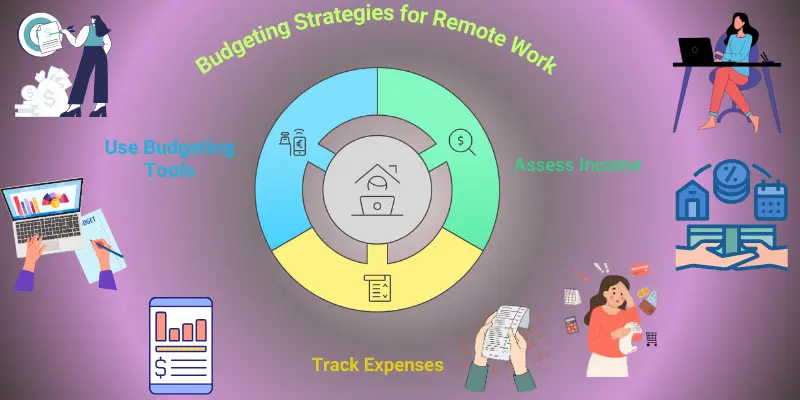Financial Wellness in the Age of Remote Work:How to Manage Your Money Better
Published: 27/03/2025
Have you ever checked your bank account and been surprised by how much you’ve spent without really thinking about it? It might be that extra coffee run or an impulse purchase you didn’t need. Working from home offers a lot of freedom, but it can also lead to a few unexpected financial challenges.
With the lines between work and home life blending, it’s easy to lose track of your spending and forget about the bigger picture. So, how can you stay on top of your finances while enjoying the perks of remote work?
In this post, we’ll walk through some practical ways to manage your money while working from home. Whether it’s setting up a budget, saving for the future, or handling taxes, I’ll share simple steps to help you feel more in control of your finances.
Ready to get started and make your money work for you? Keep reading!
What Is Financial Wellness? A Guide to Feeling Secure and Confident
Financial wellness isn’t just about having a full bank account—it’s about feeling secure and confident in your money management. Especially for remote workers, this concept can feel a bit slippery, since the structure of a regular paycheck and fixed work hours is often replaced by more flexibility and uncertainty. So, what does financial wellness look like for you?
- It’s about control: Knowing where your money goes and having a plan for it.
- It’s about confidence: Feeling prepared for life’s unexpected expenses without stressing.
- It’s about freedom: The peace of mind to focus on work without constantly worrying about bills or your future.
When you’re working remotely, there’s often no clear division between your workday and your personal life. That’s why it’s even more crucial to stay on top of your financial game, so you can have a balanced life and avoid financial stress.
Did You Know?
- 62% of remote workers say fluctuating income increases financial stress.
- On the bright side, remote employees save around $4,000 a year on commuting and work-related costs (Global Workplace Analytics).
Since your work and personal life blend more at home, managing money well is key to avoiding stress.
Budgeting for Remote Work: How to Take Control of Your Finances
Budgeting when you’re working from home (or wherever your “office” may be) can seem tricky. Your income might fluctuate, and those small home office expenses can sneak up on you. But don’t worry, budgeting doesn’t need to be a nightmare—it just takes a bit of organization.

- Assess your income: If you’re a freelancer, your paycheck might vary each month. Track your average income over the past few months to get a realistic view of your finances.
- Track fixed and variable expenses: Fixed expenses like rent and utilities are easy, but it’s the variable costs—coffee runs, office supplies, or your subscription to the latest streaming service—that can add up fast.
- Use tools: Budgeting apps like Mint or YNAB can help you categorize your spending and stick to your goals. Plus, you can automate bill payments to avoid late fees.
Remember, a good budget isn’t about depriving yourself—it’s about making intentional choices with your money.
Think of it like meal prep: planning your meals in advance saves you time and energy throughout the week.
Taxes Got You Stressed? Here’s How Remote Workers Can Stay on Track
Let’s talk about taxes. If you’re a remote worker, you may have a few extra considerations that traditional office employees don’t. Don’t worry, we’ll break it down simply.
What You Need to Know About Taxes
- Tax implications for remote workers: Whether you’re a full-time employee or a freelancer, you’ll need to keep track of your income for tax purposes. Self-employed workers may have to pay self-employment tax in addition to regular income tax.
- Set aside money for taxes: The best way to avoid tax-time panic is to set aside a portion of every paycheck for taxes. A good rule of thumb is to save about 25-30% of your income for taxes if you’re self-employed. It may sound like a lot, but trust me, it’s worth it.
- Consult a pro: If your situation is a bit more complicated (e.g., working across states or countries), it’s a smart move to consult with a tax professional to make sure you’re doing everything by the book.
In short: Keep track of your income, save for taxes, and don’t be afraid to ask for help when you need it. Taxes are no fun, but managing them well can save you a ton of stress (and money) down the line.
Saving for the Future—Even on a Remote Worker’s Budget
It’s easy to put off saving when your paycheck varies or you’re just focused on getting through the month. But the sooner you start building your financial cushion, the better. And the great news is, you don’t need to be rolling in cash to save for the future.
Where to Focus Your Savings
- Emergency fund: Aim to save 3-6 months of living expenses in an emergency fund. This will give you a safety net in case of unexpected events—like a slow month of freelance work or an emergency situation.
- Retirement savings: Remote workers don’t have a 401(k) plan automatically set up, but that doesn’t mean you can’t save for retirement. You have options like an IRA or a Solo 401(k) if you’re self-employed.
- Automate your savings: Make saving easier by automating transfers into your savings or retirement accounts. You can set up a direct deposit that moves money straight into a savings account before you even touch it.
Pro Tip: Think of saving for the future like watering a plant—it takes time, but the results are worth it. Even small contributions add up over time!
Healthcare & Insurance for Remote Workers
As a remote worker, healthcare can feel a bit more complicated since you’re no longer covered under an employer’s plan. But there are options available, and it’s essential to get it right.

Your Healthcare Options
- Private insurance or marketplace plans: If you’re not covered through your partner’s plan or a job, you’ll need to look into private health insurance or plans through the Health Insurance Marketplace.
- Consider Health Savings Accounts (HSAs): If you’re eligible for a high-deductible health plan, an HSA can be a great way to save for medical expenses while also getting tax advantages.
- Shop smart: Don’t just grab the first plan that comes up—compare premiums, coverage, and out-of-pocket costs. Health insurance is one of those things where you really want to be informed, not rushed.
Pro Tip: Just like with taxes, it’s easy to procrastinate on healthcare, but taking the time to choose the right plan will pay off in the long run. Trust me—being covered means less stress down the road.
Avoiding Common Financial Pitfalls for Remote Workers
Remote work has a lot of perks, but it can also lead to some sneaky financial pitfalls. Here are the ones you’ll want to avoid:
Common Money Mistakes & How to Fix Them
- Blurred boundaries between work and personal life: Without clear separation between work and home, you might find yourself spending more on things like takeout, coffee, or other small expenses that add up.
- Isolation and stress spending: Working solo can sometimes lead to financial stress. Whether it’s retail therapy or overspending to cope with burnout, it’s easy to fall into the trap. Recognize the signs early and avoid those impulse purchases.
- Failing to plan for taxes and retirement: It’s tempting to think “I’ll deal with that later,” but not planning ahead can lead to hefty tax bills or no retirement savings when you need it most.
Pro Tip: Create a separate bank account for business expenses (if you’re self-employed) and stick to a routine for your personal spending. Treating your remote work like a job (even if it’s at home) helps keep the financial boundaries clear.
Long-Term Strategies for Financial Wellness
Financial wellness isn’t just about getting through the month—it’s about setting yourself up for a secure and thriving future. Think of it like planting a tree: you water it a little every day, and over time, it grows strong and provides shade (or in this case, financial security). Here’s how you can build and maintain your financial health for the long haul:

1. Keep Your Budget Fresh
Your budget isn’t a one-time thing—it’s a living, breathing plan that should grow with you. As your income, expenses, and goals change, so should your budget. Set aside a little time each month to check in on your spending. Are you sticking to your goals? Do you need to adjust for new expenses or savings targets?
Pro Tip: Use budgeting apps like Mint or YNAB to make this process easier. They’ll help you track your spending and spot areas where you can save.
2. Start Investing—Even If It’s Small
Investing might sound intimidating, but it doesn’t have to be. Start with simple options like low-cost index funds or ETFs. These are like the “set-it-and-forget-it” crock pots of investing—they spread your money across a bunch of companies, so you don’t have to worry about picking the “right” stock.
Pro Tip: If you’re new to investing, check out resources like The Simple Path to Wealth by JL Collins or beginner-friendly platforms like Vanguard or Fidelity.
3. Build Multiple Income Streams
Let’s face it—remote work can come with income ups and downs. That’s why having more than one source of income is a game-changer. Whether it’s freelancing, starting a side hustle, or creating passive income (like selling digital products or renting out a spare room), diversifying your income can give you stability and peace of mind.
Pro Tip: Start small. You don’t need to launch a full-blown business overnight. Even a few hours a week can add up over time.
4. Think of Financial Wellness as a Marathon, Not a Sprint
Here’s the thing: building financial wellness takes time. It’s not about making huge changes overnight—it’s about small, consistent steps that add up over time. Think of it like training for a marathon. You don’t run 26 miles on day one; you start with a mile and build from there.
- Pro Tip: Celebrate small wins along the way. Paid off a credit card? Saved your first $1,000? That’s progress worth celebrating!
Visualize Your Financial Journey
To help you stay on track, here’s a simple timeline to guide your long-term financial goals:
- Year 1: Build an emergency fund (aim for 3-6 months of living expenses).
- Year 3: Start investing in low-cost index funds or ETFs.
- Year 5: Have multiple income streams and a solid start on retirement savings.
Why This Works:
By focusing on these strategies, you’re not just surviving—you’re setting yourself up to thrive. Your financial future is in your hands, and every small step you take today brings you closer to a more secure tomorrow.
Remember, financial wellness is a journey, not a destination. Start small, stay consistent, and don’t be afraid to ask for help or learn as you go. You’ve got this!
Want to Dive Deeper? Check Out These Resources
If you’re ready to take your financial knowledge to the next level, here are some great books and videos to explore. These resources are packed with expert advice and actionable tips to help you master your finances—whether you’re just starting out or looking to fine-tune your strategy.
Books to Add to Your Reading List
- The Total Money Makeover by Dave Ramsey:
Why It’s Helpful: This book is a classic for a reason. It’s full of practical advice on managing debt, building credit, and creating a solid financial plan. If you’re looking for a step-by-step guide to taking control of your money, this is it.
- Your Score: An Insider’s Secrets to Understanding, Controlling, and Protecting Your Credit Score by Anthony Davenport:
- Why It’s Helpful: Written by a credit expert, this book breaks down everything you need to know about credit scores—from how they’re calculated to how you can improve yours. It’s a must-read if you’re serious about boosting your financial health.
Videos to Watch
- How to Build Credit from Scratch by Graham Stephan:
Why It’s Helpful: This YouTube video is perfect for beginners. Graham explains how to build credit even if you’re starting from zero, with easy-to-follow steps and real-life examples.
- The Truth About Credit Scores by Liz Weston (TED Talk):
Why It’s Helpful: Liz Weston, a certified financial planner, shares insights into how credit scores impact your financial life and how you can improve them. It’s a quick, engaging watch that’s packed with valuable information.
Think of these resources as your financial toolkit. They’re here to help you learn, grow, and stay motivated on your journey to financial wellness.
Wrapping Up: How to Take Control of Your Financial Future
In summary, managing your finances as a remote worker doesn’t have to be overwhelming. By focusing on a few key areas, you can take control of your financial wellness:
- Understand financial wellness: It’s about control, confidence, and freedom in your finances.
- Build a budget: Track both fixed and variable expenses to stay on top of your spending.
- Manage taxes: Set aside a portion of your income for taxes and seek professional advice if needed.
- Save for the future: Start building an emergency fund and retirement savings, even if it’s just small contributions.
- Secure healthcare: Look into private insurance options or marketplace plans to ensure you’re covered.
Ready to take charge of your financial future?
If you found this post helpful, make sure to comment, or share it with someone who could benefit from these tips! Together, we can achieve financial wellness and make remote work work for us—not just professionally, but financially.
Take action now: Start today by setting up a budget, planning for taxes, and making small but meaningful strides toward a secure financial future. Your future self will thank you!
Your Financial Wellness Questions Answered: Clearing Up Common Doubts
Yes, remote workers, especially freelancers, need to keep track of their income for tax purposes. Set aside about 25-30% of your earnings for taxes, and consider consulting a tax professional if you’re unsure about your situation.
Use a simple spreadsheet for budgeting apps to track your income and expenses. Freelancers may have fluctuating pay, so it’s important to calculate an average over several months to get a clear picture.
Besides health insurance, look into renters or home insurance if you’re working from home. Depending on your profession, you might also need professional liability insurance.
Keep track of every business-related expense and income. Make quarterly tax payments to avoid a big tax bill at the end of the year, and consult a tax professional if you’re unsure about deductions.

- Be Respectful
- Stay Relevant
- Stay Positive
- True Feedback
- Encourage Discussion
- Avoid Spamming
- No Fake News
- Don't Copy-Paste
- No Personal Attacks

- Be Respectful
- Stay Relevant
- Stay Positive
- True Feedback
- Encourage Discussion
- Avoid Spamming
- No Fake News
- Don't Copy-Paste
- No Personal Attacks





